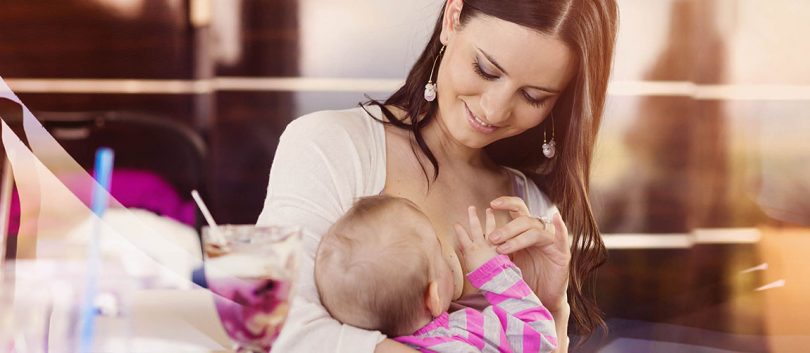“Could you go to the bathroom or somewhere else to do that?”
“Please cover up. I can see your breast.”
“Wouldn’t you like some privacy for that? Maybe go to the bathroom.”
“We don’t allow breastfeeding in our store.”
Selena Carlson-Hagstrom, a mother of four from Newport News, Virginia, has been repeatedly asked to go elsewhere, or has heard mean comments (like “disgusting!”) from strangers.
What was she doing? Breastfeeding.
“Anytime I nurse, I’m looking for a place to comfortably feed my baby, not a debate. My response to anyone who spoke negatively was usually ‘I’m feeding a hungry baby, why do you care?’” she says.
If you are not pregnant or breastfeeding, you may not know that the law in Virginia changed in 2015 to affirm a woman’s right to breastfeed in public. This issue has some controversy around it—especially since breastfeeding rates have significantly increased over the past few decades.
Today, the awareness of the health benefits of breastfeeding for the child and the mother have increased, and more women are breastfeeding their newborns, babies and sometimes, toddlers. In Virginia, 80 percent of women have breastfed at some point; with 27 percent still breastfeeding at 12 months, according the Centers for Disease Control.
“Most moms know the benefits for babies, and the CDC and Office of Women’s Health have pushed to increase public awareness. Breastfed babies have fewer infections, which can lead to less medication and hospitalization,” says Dr. Michelle Brenner, pediatrician, lactation consultant and medical director of The King’s Daughters Milk Bank at Children’s Hospital of The King’s Daughters in Norfolk, Virginia.
When traveling by car across several states, Carlson-Hagstrom made sure to check the laws about breastfeeding as they crossed state lines.
“Honestly, the states we’ve traveled through on our way to see family in Minnesota seemed breastfeeding-friendly, but we always double check. I find it sad we need a law to protect nursing, but I am glad it’s there. I hope it encourages educational supportive dialogue for those who are ignorant of the normalcy of breastfeeding,” Carlson-Hagstrom says. Virginia law (House Bill 1499) now says it’s legal to breastfeed on private property that is open to the public or “any place where the mother is lawfully present.” Although the bill was proposed several years in a row, the General Assembly passed it in the 2015 session with Delegate Dave Albo (R-Springfield) as the sponsor.
“It wasn’t illegal but people could be told not to do it. Think of this as an anti-discrimination law. It’s the same idea. The owner can’t say ‘get out’ to a mother feeding a hungry baby,” says Albo.
Stacy Kern-Scheerer, a professor of the practice at The College of William & Mary, says that there was no law saying women couldn’t breastfeed in public, so there was no enforcement.
“The law was silent on this before. But now, this law is saying affirmatively that you have the right to do it. This is a real shift, under the broad umbrella of health,” Kern-Scheerer says.
Another benefit of the law is that a business owner who has a patron complain about a breastfeeding mother can now say “she has the right to do that,” and it may diffuse the situation.
“There has been a change in perception, and the health benefits for mother and baby are more well-known, but there were also a few moms who championed the cause to make it happen,” Kern-Scheerer says.
For women who are struggling to breastfeed or reluctant to do so in public, knowing that they cannot be asked to move, leave or stop breastfeeding may strengthen their resolve to do so wherever and whenever needed.
“It’s fantastic that Virginia has recognized the rights of women to breastfeed, offering moms more freedom, comfort and confidence and in the future, encouraging other moms as well,” says Dr. Brenner.
CHKD and Easter Virginia Medical School participate in the “Breastfeeding Welcome Here Project,” a campaign to increase public acceptance, with signs displaying a breastfeeding icon that say “Breastfeeding Welcome Here.” Many breastfeeding advocates claim that “if you don’t support breastfeeding in public, you don’t support breastfeeding,” so making it clear that it’s not just legal, but welcome helps.

